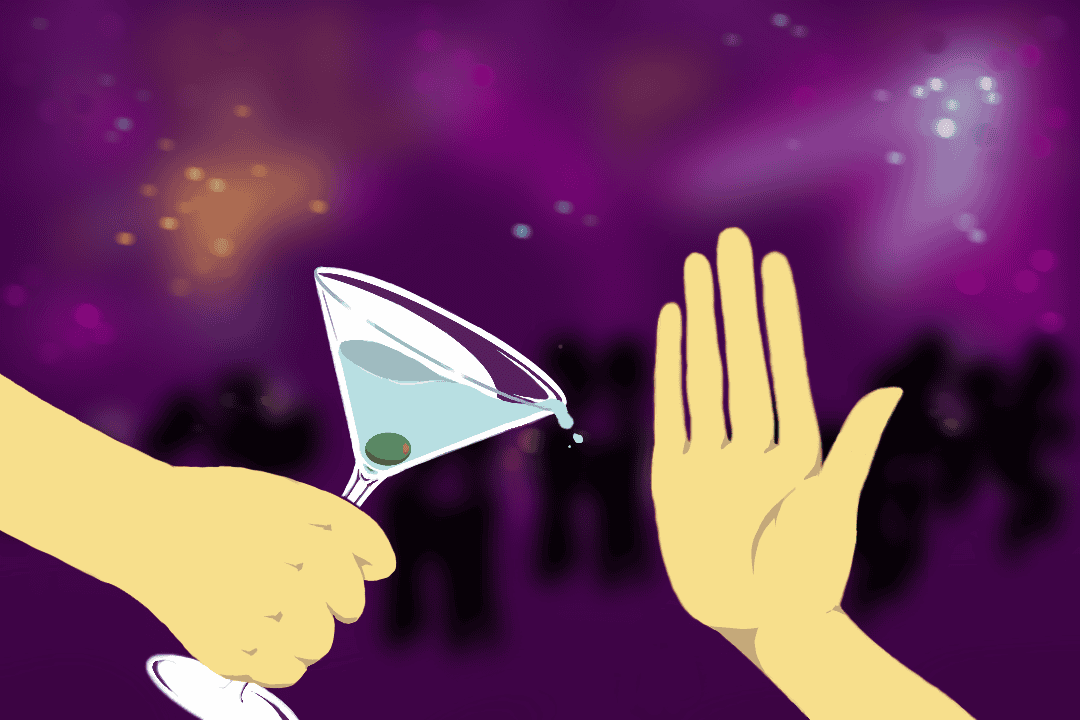The two-edged sword of booze: to let loose or fear losing control?
According to Forbes, the demand for the non-alcoholic market is expected to grow by 25 per cent throughout 2022 and 2026. I believe this ‘sober-curious’ movement can be associated with the younger generation’s shifting attitude and their evolving relationship with drinking, as Gen Z is reported to drink 20 per cent less than millennials.
College drinking typically begins during a student’s first and second years, with 19 being the legal drinking age in Ontario. Students at the St. George campus often fall into the embrace of Madison Avenue Pub, known more affectionately as “the Maddy” by students, with its lingering sweat odor and special haze that masks one’s vision.
A lot of my increased drinking occurred during these first two years. It was mostly out of curiosity and an eagerness to match the habit and intensity I had seen portrayed in mainstream media. Yet, it soon became painfully obvious that I knew less about drinking than many of my peers and even my parents. However, in order to engage in what seemed to me like an overrated chorus of supposed gratification, I would drink out of obligation.
It wasn’t until I met a group of peers who were open-minded about various drinking experiences that I began to appreciate the art of preparing drinks for gatherings with friends or ‘pre-gaming’ before heading out to bars. To my delight, they introduced me to the endless, creative possibilities of mocktails for those who are sober or simply want to drink mindfully.
Those Facebook motivation quotes might be right: Health is wealth
As young adults, we’re expected to make informed decisions and understand their impacts. I would even argue that newer generations are becoming increasingly health-conscious. Being a member of Gen Z, I grew up with middle school curricula that taught me the dangers of substance use. Now, with TikTok, we bear witness to the indestructible, multi-coloured Stanley cups for hydration and the nightstand Ashwagandha capsules for better sleep. Sure, the ’80s had leg-warmer aerobics, but you could still smoke on a plane then.
But what about the unseen and inexplicable effects of drinking? Undergraduate life can be distressing, and the National Library of Medicine reports that individuals with common mental health disorders, such as depression and anxiety, are twice as likely to report alcohol use disorder — including harmful and dependent drinking — than those without mental health disorders.
Evidence from the National Institute on Drug Abuse shows that alcohol dependencies and extreme drinking can lead to increased mental health issues, and Gen Z is the generation most likely to report struggles with mental health. Does that mean previous generations didn’t grapple with poor mental wellness and detrimental binge drinking? Probably not. However, in my view, Gen Z is making the stride to address their difficult feelings and vulnerabilities by exploring a potential path of sobriety.
I think that this recent wave of health consciousness, including this newfound sober-curiosity, has become trendy, similar to how the wild college party life is typically considered to be cool.
Furthermore, many existing worries which transcend the scope of our control may contribute to Gen Z’s decreased participation in drinking. For example, The Guardian reports that Toronto ranks 84th out of 94 international cities in terms of affordability. This suggests to me a bleak insight to the future, promising financial uncertainty for a large majority, and you might find yourself checking your banking statements before splurging on a $20 cocktail.
It looks different for everyone
When you enter university, you’ll likely realize how much larger the world actually is as your autonomy and responsibilities increase tenfold. Beyond health concerns or personal preferences as simple as taste, I’ve encountered students who abstain from drinking due to cultural or religious beliefs. There are also students who used to drink but are now pursuing a sober life to achieve their personal goals or journeys.
For reasons specific or casual, people will decide whether to drink and set their own limits. I assure you, going to a club like Toronto’s beloved Apt 200 sober won’t denounce your youth. You can also enjoy weekend listening bars with a simple Perrier in hand. In fact, I would also argue that a night-in to catch up on sleep might be the best retreat from the snare of U of T.
With a growing discussion around mental health, candidness about substance use, and the shadow of an economically discouraging future, I believe Gen Z wields sacred knowledge in the face of a new party culture. It’s the power and desire for choice.
Mia Rodrigo is a third-year student at Victoria College. She is an executive member of the Arts & Science Student Union.



No comments to display.